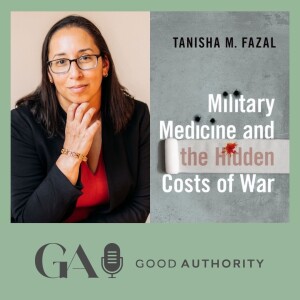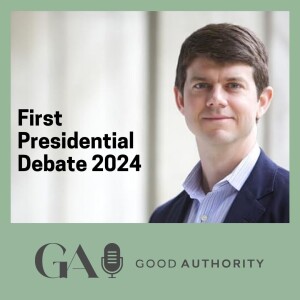Episodes

Sunday Mar 09, 2025
PEPFAR has saved 25 million lives. Without it, millions will die.
Sunday Mar 09, 2025
Sunday Mar 09, 2025
The Trump administration’s freeze on foreign aid puts the lifesaving program PEPFAR at risk, halting the distribution of essential HIV/AIDS medications in over 50 countries. Despite an emergency humanitarian waiver, the executive order dismantling the U.S. Agency for International Development (USAID) has created both confusion and life-and-death consequences. Good Authority Editor-in-Chief Kim Yi Dionne reads her February 2025 article, "PEPFAR has saved 25 million lives. Without it, millions will die."

Saturday Feb 08, 2025
What’s next after the ceasefire in Gaza?
Saturday Feb 08, 2025
Saturday Feb 08, 2025
Barbara Walter spoke with Good Authority a year ago about the war in Gaza, drawing from her New York Times bestselling research on how civil wars almost always fight until the end – unless an outside power steps in to guarantee a peace agreement. Now that a ceasefire is in place, she revisits her initial analysis and how domestic political factors are likely to shape what happens next.

Monday Feb 03, 2025
So what really determined the 2024 U.S. presidential elections?
Monday Feb 03, 2025
Monday Feb 03, 2025
Pundits and scholars were quick to propose reasons for the 2024 presidential election outcome, from the economy to foreign affairs to campaign strategy—but what does the evidence actually say? Good Authority publisher John Sides and political scientist Danny Hayes, both experts on U.S. elections, explore what factors were likely the most decisive. While some questions remain unanswered, they find key points of consensus on what truly shaped the results.

Sunday Jan 26, 2025
What's next for South Korean democracy?
Sunday Jan 26, 2025
Sunday Jan 26, 2025
After declaring martial law in December, South Korean President Yoon Suk Yeol has faced impeachment, arrest, and detention on charges of inciting insurrection. Jean Hong, a professor at the University of Michigan who specializes in the political economy of authoritarianism in East Asia, analyzes the implications for democratic consolidation. She discusses public opinion and the emergence of the far right, along with how legal proceedings are likely to evolve.

Sunday Nov 03, 2024
On foreign policy, has Donald Trump become predictable?
Sunday Nov 03, 2024
Sunday Nov 03, 2024
Is America ready for a second act of Trump's foreign policy—this time, no restraints? In a recent blog post, Columbia University political scientist and Good Authority senior editor Elizabeth Saunders wrote about what happens when the 'madman' in U.S. politics suddenly becomes predictable. Kim Yi Dionne, editor in chief of Good Authority, reads out the article in this bonus content shared ahead of Tuesday's U.S. elections.
Photo of Donald Trump at an Arizona campaign rally in 2024 courtesy of Gage Skidmore via Flickr.

Friday Sep 27, 2024
Why do so many countries keep subsidizing gasoline?
Friday Sep 27, 2024
Friday Sep 27, 2024
Despite promising to reduce greenhouse gas emissions in the 2015 Paris Agreement, many governments maintain low gasoline taxes or even allow citizens to buy gasoline below market prices. UCLA professor Michael Ross explains why it has proven to be so hard to move away from gasoline subsidies and, more generally, why price-based fossil fuel policies are often politically unsustainable.

Monday Sep 02, 2024
Why Elon Musk’s politics are so problematic for Tesla
Monday Sep 02, 2024
Monday Sep 02, 2024
Why have Elon Musk’s politics hurt Tesla? In a recent blog post, UC Irvine political scientist and Good Authority contributor Michael Tesler wrote about how Elon Musk is alienating the consumers who are most likely to buy electric vehicles. Kim Yi Dionne, editor in chief of Good Authority, reads out the article in this episode.

Monday Aug 05, 2024
Monday Aug 05, 2024
Martha Finnemore, recent winner of the Johan Skytte Prize in Political Science, discusses the critical role of norms in international affairs. She explains how norms develop, what they are and are not, and how they shape international relations. She also highlights how norms influence current issues such as cybersecurity and artificial intelligence.

Wednesday Jul 10, 2024
Why the U.S. continues to underestimate the true long-term costs of wars
Wednesday Jul 10, 2024
Wednesday Jul 10, 2024
University of Minnesota professor Tanisha Fazal discusses her new book, "Military Medicine and the Hidden Costs of War." In the book, she highlights how modern advancements in military medicine reduce American fatalities but lead to underestimations of war costs, which have long-lasting impacts on veterans, their families, and the U.S. Treasury. Dr. Fazal joins Good Authority to discuss the shifting ratio of wounded to killed, unforeseen expenses such as Civil War pensions, and how the U.S. can more effectively estimate the financial costs of wars.

Thursday Jun 27, 2024
Why it’s gotten harder to predict the outcome of the 2024 debates
Thursday Jun 27, 2024
Thursday Jun 27, 2024
The first presidential debate takes place tonight. As you probably know by now, Biden and Trump agreed to this June 27 debate and a second one on September 10. They are not going to do the usual three debates overseen by the Commission on Presidential Debates in late September and early October.
Of course, the big question is: In a year of remarkably stable polling, could this debate actually change the state of the race? This is a more complicated question to answer than usual – and we can blame this new debate schedule.
What the previous research says
In August 2012, I wrote a piece summarizing the political science literature on the presidential debates from 1960-2008. Here’s a one-sentence summary: Debates have moved the polls but they have rarely decided the election.
There are two big reasons why. First, the debates took place later in the election season and there weren’t many undecided voters at that point. Second, it has proven tough to “run the table” and win all the debates so convincingly that the winner received a durable benefit. Typically, the candidates have fought to a draw.
By contrast, the party conventions have had larger effects, on average. They have typically occurred earlier than the debates. And because the conventions no longer experience much drama about who’ll be the nominee, they have become infomercials for that candidate. By design, no debate tends to be that one-sided.
Not much about the 2012 debates changed those conclusions, I argued after that election. Mitt Romney did gain a few points after the first debate, but Barack Obama did better in the last two and the end result was basically a wash. There weren’t big debate effects in 2016 or 2020 either, or so we found in our books on those elections.
What’s unusual in 2024
But this year’s schedule creates the potential for something different.
For one, the first debate will take place quite early. There should be more undecided voters than there will be in October. And we know that Joe Biden has work to do rallying Democrats and Democratic-leaning voters. If Biden “wins” the debate – I use scare quotes because these judgments are always subjective – it could boost his standing within the party even before the Democratic convention.
Then there is the Republican convention from July 15-18 and the Democratic convention from August 19-22. This will allow us to observe the potential impact of each. In some years, like 2020, the party conventions are so close together that you can barely see any impact of the first before the second one kicks in. But note also that party conventions have had smaller effects in recent elections.
The second debate on September 10 will also take place earlier than the first debate typically has. So, once again, there could be potential for the polls to move. Moreover, convention bumps sometimes decay and either candidate could benefit from a highly publicized victory in the September debate.
But then… there will be almost 2 months until Election Day. That’s plenty of time for any impact of the final debate to disappear, or another late-breaking event to override the debate’s impact.
It’s also worth noting that Biden has already reserved more time for televised advertising in the fall than Trump has. If those ads have an effect – and there is evidence that advertising can have a small effect – then that could be the ultimate deciding factor in a very close election, not a debate that occurred weeks or months earlier.
In sum, for a long time the presidential campaign calendar followed a pattern: summer party conventions followed by fall debates. That’s what the political science research has studied.
In 2024, we’ll get to study something different – with less predictable consequences.
For further discussion on the 2024 debates, listen to my conversation with Good Authority Editor Erik Voeten.





